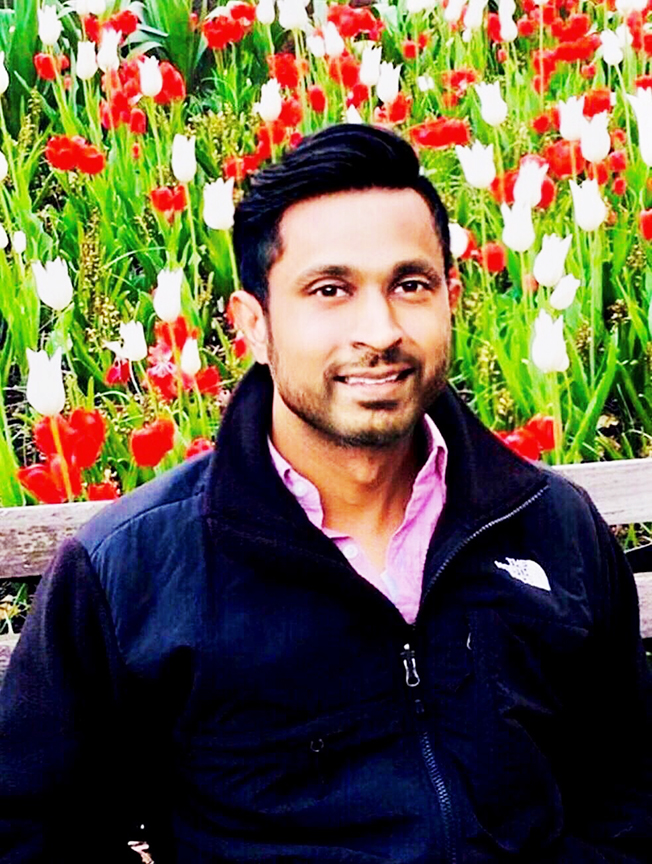With the novel coronavirus disease (COVID-19) placing New York (NY) hospitals under severe stress, Guyanese siblings, Dr. Saleem Bacchus, and his sister Isha Bacchus, who survived COVID-19, are among frontline workers battling to save lives.
Every day is a day of fear of contracting the virus but while Dr. Bacchus, an emergency medicine specialist has stayed safe so far, Isha was not so lucky. She is an occupational therapist at a rehabilitation and nursing home.
Her symptoms started on March 27 after she came home from work. She recalled that she felt “feverish and was having chills and body pain.”
She suspected that it was the virus and immediately isolated herself in a room. That helped to prevent it from spreading to her husband and children.
The following day she went to get tested and the doctor prescribed antibiotics and painkillers. One week later she learnt that her COVID-19 test was positive.
Even though her symptoms continued she refused to go to the hospital.
Dr. Bacchus visited her home and checked her vitals. He suggested she maintain her fluids and continue to be up and about to not let fluid sit in her lungs.
She also received intravenous treatment from another health care provider.
Two days later her condition improved and she called her boss to inform her that she was ready to work again.
She believes that: “Being active builds endurance. If you don’t use it (strength) you lose it.”
She recalled that she was the last person to be in contact with a patient, who was later tested positive for the virus.
Two other people from her job also contracted the virus at different times.
Currently, she is treating six COVID-19 patients. This includes one that is critical and she tries to get him respond to stimuli.
Although she enjoys caring for her patients, going to work now is a hard task because of the “hazmat suit” (PPE) that she has to wear all day. It makes you sweat a lot and sometimes you can’t see properly.”
‘Mask man’
Dr. Bacchus believes that he remains safe from the COVID-19 because even before the pandemic started he always wore a mask.
“The mask was protecting me from the common cold and flu. People always used to call me the mask man… Then when all this started, everyone started wearing the masks and protective gear,” he told SN.
“Of course, everyone was scared. We were especially scared because we were running out of gowns and masks.”
He said they were given swimming goggles to wear for eye protection.
He said his faith in God kept him strong. He also “improvised as best as I can to get my own version of PPE.”
According to him, even though the death toll was rising in China, no one was taking the virus seriously because no one expected NY to get to that stage.
Dr. Bacchus later learnt through news outlets that the first COVID-19 case in New York was diagnosed at the hospital where he works.
The patient showed up with pneumonia in both lungs and kept getting worse and was intubated. They (attending doctors) did not know what it was. Eventually they decided to test him for Covid.”
He was tested positive and two weeks later he was extubated.
Doctors that Dr. Bacchus enjoyed working with also got sick and had to stay at home. Thankfully, they all got better and returned to join the battle to save lives.
A staff member at the hospital, who is Dr. Bacchus’ close friend, also became sick.
“He had the double pneumonia, some difficulty breathing and was delirious. He improved and was discharged. However, he lived alone and had no one to check on him…, “ he said.
Texts and phone calls from another friend’s phone went unanswered.
Someone was sent to his home but he “appeared delirious and slammed the door on that person. After that I grew (concerned) that he was checked on.”
The police were then summoned and “got there in the nick of time.” The cops managed to enter the house and the staff member collapsed in their arms.
He was rushed to the emergency room and was immediately intubated.
He remains in hospital more than one month later with respiratory and kidney failure.
Other patients also experienced organ failures, including the kidneys and lungs.
They would have diarrhoea and vomiting and would eventually develop pulmonary embolism (clots in the lungs) and may not make it out alive.
Dr. Bacchus noted too: “It was scary that patients were coming with low oxygen levels (hypoxia) and we know that there is not much we can do. It is mostly their bodies healing themselves…”
“The situation soon became really bad, with almost every patient having double pneumonia. Their oxygen levels were very low too. Some were as low as 50 percent. In normal time, anything below 90 percent was considered critical…”
It had come to the point where new guidance was being released to Emergency Medical Services (ambulances crews), that if they can’t resuscitate a patient in the field, they must withhold CPR and declare a person dead.
He pointed out that with no cure for the virus, they have tried “experimental medication, but nothing is really working for sure. There are daily deaths…”
He said New York is a “prime place for corona spread because of its dense population and that many people have caught the virus in buses and trains.
Some people who never left their homes were also contracting the virus. It later appeared children, who did not really show symptoms may be one of the main carriers.
“They picked it up at schools and spread it at home to their parents and grandparents,” he pointed out.
There has been a reduction of very ill patients and Dr. Bacchus hopes that “it is a sign that we are on the recovery mode.”

